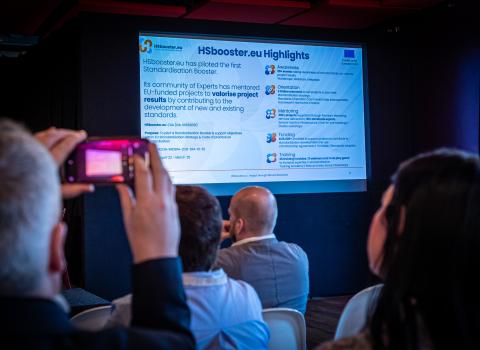The European Parliament’s Research, Industry and Energy (ITRE) committee is considering shifting funds from the EU’s proposed €80 billion Horizon 2020 R&D programme towards more support for small and medium sized enterprises (SMEs), says Jürgen Creutzmann, the MEP in charge of drafting Parliament’s position on a newly proposed support programme for SMEs.
In an interview with Science|Business, Creutzmann pointed out that many SMEs might not fulfill the participation requirements of Horizon 2020. “I fear that smaller SMEs will not have a chance to participate in Horizon 2020. A smaller company – with, for example, a hundred employees, might not be able to participate in Horizon 2020 because it does not have the financial means to conduct innovative research, or it does not qualify as innovative at all.”
The SME scheme that Creutzmann would like to see topped up is the Programme for the Competitiveness of Enterprises and SMEs (COSME), which as it stands has a planned budget from 2014 - 2020 of €2.5 billion.
COSME is set to replace part of the current Competitiveness and Innovation Framework Programme (CIP) in 2014. But the majority of the current CIP programme, which has been supporting SMEs since 2007, will be absorbed by Horizon 2020, the EU’s next R&D funding programme. Creutzmann fears that smaller SMEs will miss the boat.
Backbone of the economy
“We are investigating whether we can take some of the Horizon 2020 programme, and use it to support SMEs,” Creutzmann said, indicating there seems to be a consensus in the ITRE committee that there should be more money allocated towards smaller SMEs. “SMEs are the backbone of our economy. We have twenty-three million unemployed in Europe, and we have twenty-three million SMEs,” said Creutzmann to illustrate his case. “This means – only in theory, of course – that if every SME would create one job, we will have solved the problem.”
COSME could also offer new opportunities for innovative collaborations between small companies and universities,” Creutzmann believes. “Universities of applied science know how to translate research into innovative products and services, and they are interested in contacts with the business world. That is why they should work together with SMEs,” he said.
“There is always a lot of talk about SMEs,” said Creutzmann, “But in reality - they are too often forgotten.”
Creutzmann is also behind a pro-SME legislative push by the European Liberals and Democrats (ALDE) parliamentary group, and intends to keep the attention in Brussels on SMEs by focusing on “cutting red tape, easier financing and better market access.” Creutzmann said extra funds for COSME could be used to increase loans and guarantees to small companies that are struggling to get their hands on sufficient capital in the current economic climate. Additional financing is badly needed for start-ups, growth and business transfers, he said.
Attracting industry
Although he is currently focussed on SMEs, big industry is another important topic for Creutzmann, who joined the European Parliament in 2009 after a long career at the chemicals giant BASF in his native Germany. Pointing out the economic importance of manufacturing industries, Creutzmann said: “About twenty five per cent of Germany’s GDP comes from industry, when you combine this with industry-related services, you get to nearly one third of its GDP.”
SMEs defined
Small and medium-sized enterprises as defined by EU law:
| Company category | Employees |
|
||||
| Medium-sized | < 250 | ≤ € 50 m | ≤ € 43 m | |||
| Small | < 50 | ≤ € 10 m | ≤ € 10 m | |||
Creutzmann believes more should be done to attract and retain industry in Europe. “In France, [the contribution of industry towards GDP] is about fourteen per cent and in Great Britain it is less than ten per cent. We need to bring more industry to Europe to create jobs.”
Energy for jobs
At the same time affordable energy is vital to Europe’s competitiveness on the world market, says Creutzmann. “We very often forget that we don’t produce for the European market. Europe’s industry produces for the world market, and you must be competitive with the products of China, India - of all the developing countries and the BRIC countries.”
Although Creutzmann thinks it is positive that the European Commission is pushing for the development of new, sustainable, energy technologies, he says Europe needs energy now. “In the past we were exporting electricity, and now we import it.” Creutzmann went on to point out that Europe can’t ditch nuclear energy – as in Germany – unless a viable replacement is ready.
Innovation in the car industry is a great example of the need to keep energy prices at an acceptable level, says Creutzmann. High energy inputs mean that new, lighter, plastics produced by Europe’s chemicals industry are too expensive for the car industry to use in the production of competitively priced energy-efficient cars. “It is a problem when our car industry is not competitive with other industries. You know new products are coming from China, India, and so on,” said Creutzmann.
Following a public hearing on COSME at an ITRE meeting on Tuesday (8 May), Creutzmann is due to present his report on the COSME programme to the ITRE committee at the end of the month. Creutzmann joined the Parliament’s Research, Industry and Energy committee as part of an influx following a reshuffle of committee memberships in January.





 A unique international forum for public research organisations and companies to connect their external engagement with strategic interests around their R&D system.
A unique international forum for public research organisations and companies to connect their external engagement with strategic interests around their R&D system.